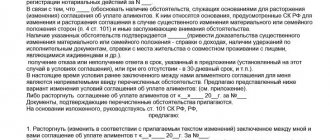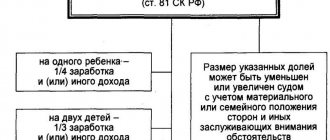2
The main responsibility of the legislation of any country is to protect its citizens, primarily those who especially need this protection - children who, after the separation of their parents, are raised only by their mother or father. Financial support for children from a parent who does not live with them, the procedure for its payment and withholding is commonplace for Russian courts and rarely causes difficulties. Another matter is the collection of alimony from citizens of other states. This procedure is extremely fussy and associated with many problems and delays.
Law defining alimony obligations for foreign citizens in Russia
Is it possible to receive child support from a foreign citizen? According to family law, it does not depend on the relationship of the parents and which of them lives with the child to what extent each of them should invest in the material support of the offspring. Both are obliged to provide equally for the child.
The right of a minor to maintenance is supported by the state, which is communicated through the laws adopted by it. In the case where one of the parents is a foreigner, additional questions arise and, often, problems with obtaining financial assistance.
Responsibilities for maintaining children are established by the state in which the family lives, introducing certain norms and rules. In case of separation, the right to provide children with a means of subsistence is established by the law of the country whose citizenship they have. In the case when an international treaty on a particular family legal relationship establishes other rules, then they must be followed, and not national legislation (Article 6 of the RF IC).
Answers to common questions
Question No. 1 : Will the employer withhold alimony from the amounts of bonuses and compensation for harmful working conditions?
Answer : Yes, the organization is obliged to withhold alimony from the full amount of income according to the writ of execution.
Question No. 2 : What liability can a parent be held accountable for in the event of malicious evasion of child support?
Answer : In accordance with Article 157 of the Criminal Code of the Russian Federation, failure by a parent to pay, without good reason, in accordance with a court decision or a notarized agreement, funds for the maintenance of minor children and disabled children who have reached the age of 18, is punishable by correctional labor for up to 1 year, or forced labor for the same period, or arrest for a term of up to 3 months, or imprisonment for a term of up to 1 year.
Rate the quality of the article. We want to be better for you:
Legal documents with data on the collection of alimony from foreigners
The main legal documents that can be referred to when collecting alimony from a foreign citizen are:
- Article 32 of the “Convention on Legal Assistance and Legal Relations in Civil, Family and Criminal Matters”, or the Minsk Convention of 01/22/1993 (came into force in the Russian Federation on 12/10/1994, as amended on 03/28/1997);
- Article 35 of the “Convention on Legal Assistance and Legal Relations in Civil, Family and Criminal Matters” of 07.10.2002.
These legal provisions state that:
- When collecting alimony, the legislation of the state where the child lives is applied.
- If the alimony obligee is wanted , then the parties (countries) have the right to assist each other in finding him.
A complete list of countries with which Russia has concluded an agreement on assistance in resolving civil cases is listed on the official website of the Federal Bailiff Service (FSSP). Decisions of the courts of the Russian Federation aimed at collecting alimony are subject to immediate execution only in states opposite the names of which in a special table in the column “Category of dispute” is indicated “Civil dispute”.
Problems and nuances
When one of the child’s parents is a foreigner, in the absence of a compromise between the man and the woman regarding the provision of the child, legal proceedings are forthcoming. If a foreign citizen does not live in the Russian Federation, then the registration of alimony has a number of nuances that need to be taken into account:
- If it is necessary to legalize the decision of a Russian court to collect alimony from a foreign citizen abroad, a parent raising a child should prepare for large expenses.
- Often, it is impossible for the plaintiff to independently represent his interests in a foreign court. It is necessary to know the national legislation of the state in which the potential foreigner who receives alimony lives. The services of a lawyer require a large investment. On average, you need from 50,000 to 250,000 rubles. It all depends on the complexity of the case and the state in which the proceedings to collect alimony from a foreigner will take place.
- The application takes a long time to be considered. So, in Panama, a decision is made within 4-18 months. If there are no multilateral agreements, the period is extended to 3 years.
A parent who is forced to compulsorily collect child support from a foreigner should understand that the same provisions of legislation in different countries can be interpreted differently. In addition, even if there are national agreements, the courts consider decisions (made by the authorities of another state) on the assignment of financial support to minor citizens with particular meticulousness and scrupulousness.
Comments Showing 0 of 0
States requiring special legalization of decisions and countries executing them automatically
List No. 01-16 of 2012 contains the names of countries that have entered into an agreement with Russia, under the terms of which they undertake to comply with decisions of Russian judicial authorities, including the use of coercive measures against citizens who have debts in alimony payments.
According to the list of decisions of magistrates of the Russian Federation on the establishment of alimony, they automatically begin to work in relation to foreign fathers of the following nationalities:
- Bulgarians;
- Egyptians;
- Hungarians;
- Spaniards;
- Italians;
- Chinese;
- Poles;
- Azerbaijanis;
- Albanians;
- Georgians.
If the husband and father of the child are a citizen of a country belonging to the Minsk Convention, the Russian mother will need to apply for legalization abroad of the Russian decision to establish alimony support.
This turn of events threatens women whose ex-husband:
- Ukrainian;
- Kazakh;
- Armenian;
- Moldavian;
- Belarusian;
- Turkmen;
- Uzbek;
- Tajik.
Inexplicable, but true: most countries that are former Soviet republics do not allow Russian courts to pass decisions on alimony obligations without hindrance. To legalize the decision, the plaintiff must submit a petition to special authorities.
Since the relevant agreements have not been adopted, writs of execution from Russian courts are invalid in relation to the following citizens living in the territory of their country:
- English;
- Germans;
- Greeks;
- Indians;
- Austrians;
- Jews;
- Belgians;
- Australians, etc.
This is also important to know:
Filing an objection to a statement of claim for the recovery of alimony payments in hard currency: the procedure for filing, drawing up an application
Under such circumstances, in order to receive alimony after a divorce, a citizen of the Russian Federation will need to go to a foreign court, hire a foreign lawyer, translator, and pay for their work herself. Abroad, the case will be considered by the court at the place of registration of the foreigner’s husband.
The procedure for indexing monthly alimony payments
Alimony calculated as a share of earnings is not subject to indexation, since it is calculated based on the amount of salary. The increase or decrease in salary depends on the employer, who decides on this independently.
Alimony, assigned in the form of a fixed amount, is set by the court as a multiple of the subsistence level for ease of indexation.
The subsistence minimum is established either at the regional level on the basis of the law of the constituent entity of the Russian Federation, or at the state level by federal law.
As soon as there is an increase in the cost of living on the basis of the law, the employer who employs the alimony worker or the bailiff is obliged to recalculate the amount of alimony collected. If the cost of living decreases, no recalculation is made.
If the employer or bailiff does not carry out mandatory indexation, it is necessary to push them to take active action by sending them an application with the corresponding requirement. The sample application, which can be downloaded here, is addressed to the bailiff, but it can also be easily converted into an application for the employer.
Collection methods
The recovery of financial assistance from a foreign parent is almost identical to the recovery from a Russian parent. However, each case is unique and requires an individual approach.
In the Russian Federation, alimony is collected from foreign citizens in the following ways:
- Peaceful (voluntary) . Applies in the event of a voluntary agreement between the child’s mother and foreign father. To ensure the legality of the agreement, it must be certified by a notary. When signing an agreement, it is necessary to draw up a copy of the agreement in the language of the state of which the child’s father is a citizen. This will ensure a more accurate understanding of the terms of the contract by both parties.
- Forced. If the foreigner husband does not pay alimony on his own. Occurs when the recipient of alimony applies to the court with a request to collect the debt for delayed payments. The difficulty is that, even with a positive decision of the court of the Russian Federation, it is not always possible to apply it in the territory of the state where the alimony payer lives. Thus, a minor may be left without a livelihood.
The child’s parents can agree on financial support between themselves orally, but such an agreement can be violated at any time. It is useful for the alimony obligee to know about the correct execution of alimony payments in order not to remain a debtor when it turns out that there is an unpaid debt during the payment periods.
To save time and effort, the collection of alimony can begin at the time of divorce from a foreigner. In this case, claims for alimony payments will be considered in a shorter period of time.
Timing and cost
The easiest way is to request alimony from a foreigner on a voluntary basis. The agreement comes into force after notarization (Article 100 of the RF IC). After this point, the parties are obliged to comply with the provisions of the document. Parents living separately make payments on the date specified on the paper; the cost of document certification is also minimal. You will have to pay a state fee of 250 rubles (Article 333.24 of the Tax Code of the Russian Federation). The amount will increase if it is additionally necessary to prepare the agreement by a notary. The cost of the service varies depending on the region and averages from 3,000 to 5,000 rubles.
If alimony from a foreign parent is established through a magistrate’s court, the period for consideration of the case will be 1 month (Article 154 of the Code of Civil Procedure of the Russian Federation). It takes another 30 days for the decision to come into force (Article 209 of the Code of Civil Procedure of the Russian Federation). However, alimony payments begin from the moment the claim is filed in court (Article 107 of the RF IC). The foreign parent is obliged to provide payments for the entire period from the moment of their assignment.
If the proceedings are carried out by a district court, the period for consideration of the case will be up to 2 months (Article 154 of the Code of Civil Procedure of the Russian Federation). The period can be extended for another 30 days if the case is very complex and requires additional consideration.
If a case on the assignment of alimony from a foreigner is being considered, the state duty is not collected from the plaintiff in Russian courts (Article 333. 36 of the Tax Code of the Russian Federation). The rule applies regardless of whether the application is submitted to the magistrate or district authority.
If the proceedings take place in a foreign court, the state fee is determined in accordance with the provisions of local legislation. Often the amount is significantly larger than the Russian one. The duration of consideration of a case regarding alimony from a foreigner also depends on the country in which the proceedings will take place.
What to Serve
According to Russian laws, to recover alimony payments, you should go to court with:
- Application for an order to collect financial assistance.
- Statement of claim.
To receive an order, the following conditions must be met:
- The baby's father must be officially registered in the documents.
- Payments will be transferred by way of a percentage deduction from the salary of the alimony obligee.
- The child's father is exempt from other child support payments.
- The alimony provider has no desire to refuse payments, but nevertheless he does not fulfill the debt.
Issue may be refused due to the following circumstances:
- lack of established paternity;
- the mother's demand to establish a fixed amount of payments;
- the alimony provider already has children to whom he pays alimony;
- existence of claims for payments for past periods;
- the father insists on canceling the payment of alimony.
While the order is being considered, the agency does not consider in detail why the defendant refuses to pay. However, thanks to this, he can then easily cancel the court order without motivating his refusal. That is why, if the child’s mother is sure that his father will object to alimony payments, it is better to immediately file a claim.
Under any circumstances, the mother must draw up a statement of claim, since the order is not issued in person.
The claim and its contents
To submit a petition, you must contact the magistrate court at the place of residence of the mother (plaintiff) or father (defendant, if he lives in Russia). Having registered with the records management department, the plaintiff becomes the owner of information about the start date of the trial and confirmation that the case has been accepted for consideration.
This is also important to know:
Termination of enforcement proceedings for alimony: all the subtleties and features of the procedure
Data required to submit an application:
- The name of the court district where the application is submitted, as well as its address.
- Personal data of the parties to the trial (full name, address, place of residence, telephone numbers).
- Indication of the name of the claim itself.
- Key information on the issue under consideration: date of marriage, date of divorce, date of birth of the child, etc.
- Information about the baby (full name, date of birth, place of residence).
- Information about witnesses (if any exist or information about them is necessary).
- Justification of the amount of collection (share of income or a fixed amount, the reasons must be indicated).
- A request to consider the case and a demand to collect alimony from the debtor.
- Copies of documents attached to the case.
- Day of filing the application.
- Applicant's signature.
- Documents confirming payment of the state duty.
The judge's responsibility is to review the request for alimony within 30 days of receiving the request.
As an additional measure, the plaintiff can file a petition (by way of writ petition) through the court of the defendant, who lives abroad. There are no mandatory requirements to do this; the court will file this petition without a plaintiff.
Sample statement of claim for recovery of financial assistance for a child from a foreign citizen
Any available claim for the collection of alimony from a Russian citizen can be used as a sample for drawing up a similar request in relation to a foreigner.
The main differences include:
- the exact address of the defendant;
- his actual place of stay and residence;
- request to receive data on the income of a foreign citizen;
- requirement to interrogate the defendant by way of a separate letter of request.
Below you can familiarize yourself with an approximate sample of a claim, based on which you can easily draw up your petition. However, you should consult with a lawyer before doing this. This sample is suitable in cases where it is necessary to recover alimony payments from a foreigner in a fixed amount. If there are additional conditions, you must seek qualified legal assistance.
In what case can a foreigner not pay child support legally?
A foreigner may not provide child support if the person is not officially recognized as the child’s parent. Initially, paternity must be established. The need to provide payments disappears if the relationship with the baby is disputed.
Similar rules apply if a refusal of alimony payments is issued by the mother of the child. A bilateral agreement is concluded between the parents, in which citizens record the fact of canceling the provision of maintenance to the offspring (Article 120 of the RF IC). Also, a foreigner has the right not to pay child support legally, based on the provisions given in the same article, for example: upon the death of the recipient of the payments, the emancipation of the child, etc.
Options for paying financial support
There are 2 options for transferring alimony:
- Postal transfer;
- bank transfer.
It is important that the recipient must select and confirm the option that is convenient for him, since he is the party in need.
Bank transfer is convenient because it is the fastest and is easy for both parties to carry out. The money received goes to a bank card and can be immediately used by the person raising the child.
Using a postal transfer, money can also be transferred to the recipient, but this will take more time, since for each transfer you will need to fill out standard documents. Given that people are involved in the process, it will take longer than translation done electronically.
If the account into which the money is received is registered in the name of the child, special permission from the guardianship authorities will be required to withdraw child support. This precaution is not intended to make life difficult for the child's mother or guardian, but to protect the minor from adult fraud.
Documentation
In addition to the claim, the recipient must provide a certain package of documents, attaching photocopies to them:
- parents' passports, copies;
- certificates of conclusion and dissolution of marriage between the child’s parents;
- birth certificate of the child;
- income certificates of both parents;
- additional papers needed to justify the amount of alimony or its fixed amount.
The bulk of the accompanying documents are attached in copies to the claim. The originals are taken with you to the court hearing so that you can familiarize yourself with them. All certificates that were issued specifically for the current case are attached in the original; you can make copies and keep them for yourself.
Drawing up a statement of claim
A statement of claim aimed at collecting alimony payments from a foreigner falls under all standard rules. It includes:
- name and address of the institution to which the paper is submitted;
- Full name and registration addresses of both parties to the case;
- information about the child born to the plaintiff from the defendant;
- the reason for the appeal (as a rule, the father’s evasion of financial support for his child);
- requirement (collection of alimony from the defendant either as a share of income, or in TDS, or simultaneously in both options);
- list of attachments (copies of pages of the plaintiff’s passport, a copy of the child’s birth certificate and a certificate of his place of residence, if available, a certificate of marriage or dissolution of marriage, as well as other materials that are important when considering the case);
- date and signature.
In her claim, a woman can indicate the desired amount and scheme for paying alimony, but the judge has the right to adjust the satisfied provisions taking into account various circumstances (the income of both parents, the needs of a minor, etc.).
Completion of the trial
When the claim is satisfied, at the end of the case the woman is given a writ of execution, which she must present to the bailiff service at the place of residence of the alimony obligee. Money will immediately begin to flow to the child only if his foreign father lives and/or works in Russia. If a foreign citizen has left for a country with which the Russian Federation has an agreement on legal assistance, in order to receive payments, one will need to go through another important stage.
The applicant or his lawyer must send the application to the Ministry of Justice of the state of which the payer is a citizen. The paper can be drawn up in free form in the language of the state where it is sent. The petition states a request to oblige the alimony provider to comply with the decision of the Russian court. The petition is accompanied by copies of the court decision and writ of execution, translated into the language of the state of the alimony payer.
Voluntary settlement
The procedure for collecting alimony does not have to be carried out only through the court. Parents can agree amicably by drawing up a mutual notarial agreement on the regular payment of contributions. This document is drawn up in the usual manner, even though one of the parties is a foreign citizen. The following information is provided here:
- name of paper;
- date and place of conclusion of the agreement;
- accurate and complete information about the father, mother and child (full name, date of birth, registration and actual residence addresses, passport data, information from the birth certificate if the child has not yet reached the age of 14 years);
- detailed information about alimony legal relations (scheme, amount, terms of payment, method of transfer/transfer, conditions for possible indexation, termination of financial support in exceptional cases, etc.);
- date and signatures.
The agreement is supplemented by a set of applications - these are:
- passports of both parties;
- the child’s birth certificate or passport (upon reaching the age of 14);
- document establishing paternity (if available);
- income certificate (only from men).
If a foreigner’s wages are paid in foreign currency, alimony can only be collected in the form of a fixed monetary amount (TDS) in accordance with Art. 83 RF IC.
After notarization, the document becomes equivalent to a writ of execution, which is issued only after the trial. This means that following the provisions specified in the paper will be mandatory for a foreign citizen. Otherwise, the woman will be able to contact the bailiff service to hold the man accountable for evading agreed upon and legally enforceable obligations.
And yet, the father will still have a way to retreat - for example, if he decides to leave the Russian Federation for another country or to his homeland. If there is an international legal agreement, the protection of the woman’s interests will still be ensured by the bailiff service, whose employees will study the provisions of the notarized document, contact their foreign colleagues, involve the man in his legal duties, and, possibly, apply the required penalties against him. But in the absence of a bilateral legal agreement, the child’s father, who has left the Russian Federation, will actually be free from the obligation to support, raise and educate him.
Judicial practice on the collection of alimony for a minor from a foreign citizen
As judicial practice shows, events in most cases develop according to two scenarios:
- If the request of the baby's mother and her lawyer is satisfied
- If the application is rejected , then you need to try hard to appeal the decision. The only way to collect alimony in this case is to wait until the foreigner returns to Russia. If this happens, he will have to pay a significant alimony debt that has accumulated during his absence, since without this he will not be able to leave the Russian Federation, being a malicious debtor and a violator of Russian laws.
This is also important to know:
Withholding alimony from a pension: amount of collection and payment procedure
Free legal consultation We will answer your question in 5 minutes!
Call: 8 800 511-39-66
The child’s mother can also try to contact the Ministry of Foreign Affairs (Ministry of Foreign Affairs) with a request to resolve the issue:
Free legal consultation
We will answer your question in 5 minutes!
Ask a Question
- on the regulations for the collection of alimony payments in a specific situation;
- or (if they have already been collected in Russia) - on the further implementation of the penalty assigned for payment of financial assistance abroad.
Considering that the Ministry of Foreign Affairs is engaged in protecting the legitimate rights and interests of Russian citizens (especially when it comes to children), the applicant may be able to receive a detailed and competent explanation of what to do in this situation, taking into account the legislation and characteristics of the state of which he is a citizen defendant.
How to collect alimony from a citizen of another country in a fixed amount
According to Russian legislation Art. 118 of the RF IC, in the event of a defendant leaving for permanent residence in a foreign state, this person must enter into an agreement on the payment of documents, and if for some reason this cannot be done, alimony in a fixed sum or the entire amount is collected from him in court for the entire payment period.
It is also possible to transfer any property in favor of the plaintiff or determine a different method of payment.
How does the process of considering a case of collecting alimony from a foreigner proceed?
The most important problem when collecting alimony from a foreigner is finding out the defendant’s opinion regarding the requirements presented. The defendant can present his position by:
- sending an application certified by a notary and translated into Russian;
- testifying in court at his place of residence (in Russia or in the country where he currently resides).
The magistrate court sends a court order to interrogate the alimony obligee to the Ministry of Justice, which forwards it to the subsequent authority. Execution of the order takes 2-3 months or more, since a foreign court may have problems establishing the location of the defendant. It is now most difficult for plaintiffs demanding the collection of alimony from residents of Ukraine to achieve a positive outcome. Given the difficult socio-political situation between the Russian Federation and Ukraine, it is often not possible to even get acquainted with the sent documents.
Other countries usually respond adequately to collection requests. Alimony payments are provided without any problems to citizens of Belarus, Armenia, Georgia, and Kazakhstan. Some difficulties arise when sending requirements for citizens of Europe - Germany, England, France, etc., but also in these cases it is possible to achieve a positive result.
Place of filing a writ of execution against a foreigner for alimony
When the magistrate has already made a decision in a case where the defendant was a foreigner, the enforcement documentation should be transferred to the SSP or the Ministry of Justice. If the documents are delivered to the address, the foreigner will not be able to avoid evading alimony payments.
Having received the legal decision of the judge, the mother must send the following package of documents to the Ministry of Justice at her place of residence:
- The original application, which indicates the requirement for the foreigner to comply with the instructions from the decision.
- Notice that the basis for compliance with the requirements is the Convention on the Collection of Maintenance Abroad.
- A certified copy of the court decision.
- Certificate of legal force of the decision obtained in court.
- Documentation on partial execution of the decision (can be obtained from the SSP of the Russian Federation).
- Plaintiff's photograph.
- Attached translations of the entire package of documents into the native language of the foreigner liable for alimony.
The Ministry of Justice checks the submitted papers within a month, then transfers them to the competent authority at the payer’s place of residence. If the plaintiff has not provided all documents, he will be sent a written response.
Procedure for enforcing a Russian court decision abroad
When receiving alimony payments from a foreigner, the legality of this procedure must be established. This stage is mandatory if the child requires financial support.
In 1993, the UN Convention was signed in Minsk, which establishes participating countries in international cooperation. If the state in question is one of them, then a petition can be filed with its judicial authority. The paper is provided through the authority that made the court decision. The following documents are also attached to the document:
- the court's decision;
- confirmation of the defendant's notification of the decision;
- certificate of partial execution of a court decision;
- agreement on jurisdiction (if one is concluded).
Each of the described documents must be translated into the language of the state in which they will be filed. Afterwards, all documentation is certified by a notary.
Thus, the collection of funds from alimony workers living abroad occurs with some difficulties. To resolve such issues, it is recommended to contact lawyers who work with court cases on alimony, who specialize in the legislation of a particular country.
Additional questions
The debtor refused to pay alimony
Don't panic. Considering how much time and effort it will take to go to court, it is worth remaining calm and in control. In order to win the case, it is worth finding a qualified lawyer with experience in handling similar cases where the defendants were citizens of the same country where the father of your child lives. If an unscrupulous foreign citizen persistently refuses to pay financial support for his child and does not want to follow the laws of the country where his baby was born, he can be forced to do so.
The interests of the recipient in this case will be protected by the laws of the Russian Federation. If the recipient cannot collect money from the defaulter, he should submit the writ of execution to the Federal Bailiff Service. Employees of the service will begin to collect the debt from the alimony obligee. The FSSP has the right to impose many sanctions on a foreigner’s husband who evades the law. These sanctions will remain in effect until the alimony payer leaves the territory of the Russian Federation. Thus, debt of any size will cause serious problems for him.
A foreign state does not cooperate with the Russian Federation
Not every foreign state will accept an application from a citizen of the Russian Federation. Refusal is usually due to politics. If an agreement has not been concluded between the country in which the defaulter lives and Russia, it will not be possible to obtain alimony by filing a claim. In order to achieve a result, you will need to hire a lawyer who specializes in the legislation of the country of which the debtor is a citizen.
This is also important to know:
Should the ex-wife account for child support?
The process of collecting alimony payments in this case will differ from the standard one. The plaintiff and his lawyer will have to turn to the current laws and understand whether it is possible to collect alimony in the current situation. You will definitely need to go to court. A lawyer will help you select the appropriate form of claim and draw up the necessary requirements. Without his help, it will be difficult to go to a foreign court. It is worth taking into account that the plaintiff may need to take part in the trial in person, which will require flying abroad.
No matter how difficult the process may be, you should not give up at the first small failures. The more confident the plaintiff is and the more persistent he is in seeking justice, the greater the likelihood of success; a qualified lawyer will take care of the rest.
Is it possible to draw up an alimony agreement with a foreign citizen?
It happens that a foreigner agrees to pay financial support for a child by court decision while on the territory of Russia, but after returning home he refuses the payments. He may not bear responsibility for the refusal, especially if he is a citizen of a country that has not concluded a cooperation agreement with the Russian Federation.
In order not to lose the due payments, it is worth trying to conclude an alimony agreement with your spouse. A correctly drawn up document obliges the father to pay child support, even if he moves to any other country.
When concluding such an agreement with a foreign citizen, you must indicate in the document in what currency and how payments will be calculated.
It is worth considering that amendments are constantly being made to the legislation of the Russian Federation, so the above information may become incorrect. To resolve issues related to Family Law, you should contact a lawyer who will share relevant information and help resolve the issue.
How to obtain alimony from a foreign citizen if he does not live in Russia
Please note that collecting child support from a foreign father is not an easy task. The foreclosure process usually takes a long time and requires a significant investment. This does not mean that you should not try; with a good lawyer, you can successfully obtain alimony.
What are the features of such a recovery?
If there is no international agreement between the homeland of the child’s father and the Russian Federation on legal assistance in civil and family matters, even if a Russian court makes a decision to pay them alimony, under the law of another country it will be invalid.
If there is an international agreement, the plaintiff will have to go through a complex procedure for collecting alimony payments through the courts in Russia.
If they want to recover financial support from a foreigner living abroad, it can be assigned by the court exclusively in a fixed amount, since the defendant receives wages (or other income) in foreign currency (Article 83 of the RF IC). The plaintiff may demand the established amount of payments in a fixed amount; during the consideration of the case, the court will make adjustments to the desired amount, taking into account the specifics of the case.
A foreign state does not cooperate with the Russian Federation
Not all countries have entered into cooperation agreements with Russia in resolving civil issues. This fact directly depends on political reasons. In this case, filing a lawsuit will not solve anything. It is necessary to seek help from a lawyer who specializes in the legislation of the country of interest.
The procedure for collecting alimony will differ from the standard one. In this case, it is necessary to study the laws of another state and evaluate the possibility of carrying out collection procedures. Next, with the help of a lawyer, you need to draw up a claim and go to a foreign court. You need to understand that it may be necessary to appear in person at the trial.









